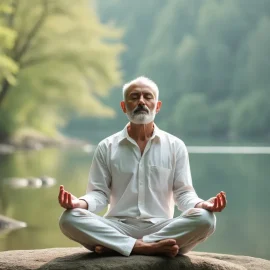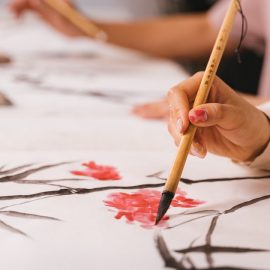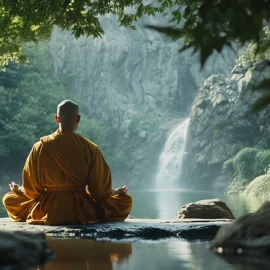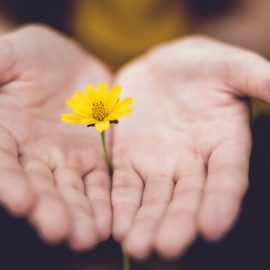
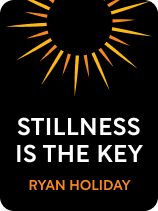
This article is an excerpt from the Shortform book guide to "Stillness Is the Key" by Ryan Holiday. Shortform has the world's best summaries and analyses of books you should be reading.
Like this article? Sign up for a free trial here.
What is Ryan Holiday’s Stillness Is the Key about? What is the key message to take away from the book?
In Stillness Is the Key, Ryan Holiday takes us through the dimensions of the mind, soul, and body, explaining how to cultivate stillness. He explains that stillness is a state of being that can enrich our lives, guide us to make better decisions, and encourage a sense of connectedness to everything around us.
Keep reading for the key takeaways from the book.
What Is Stillness?
Stillness isn’t the literal absence of physical motion. Rather, Holiday explains that it’s a perceptible state of mind that exists in the absence of physical, mental, or emotional chaos. Stillness is a state of clarity, contentment, peace, awe, love, fulfillment, and brilliance. He likens it to the Buddhist concept of “satori,” an experience of deep insight and awakening, or a state of enlightenment.
(Shortform note: According to Buddhists the state of satori is actually our original, natural state, to which we can return through the practice of meditation. Buddhists believe that of all living creatures, only humans have strayed from this original enlightened state of being.)
Additionally, stillness is a state of being that gives you strength and courage to deal with adversity and difficulty. For example, Holiday says stillness was the quality that allowed Anne Frank to endure the horrific experience of persecution in Nazi Germany with such grace and peace of mind.
(Shortform note: Perhaps the most remarkable quality Anne Frank possessed was her ability to maintain optimism in the face of unimaginable horror. Psychological research has shown that maintaining a positive outlook is the single greatest predictor of how resilient one is in adversity.)
In Stillness Is the Key, Ryan Holiday assures us that stillness is accessible to everyone at any time, but that doesn’t mean it’s easy to access—it requires substantial practice and discipline. Even when we do experience stillness, he says, we often only experience fleeting moments of it. You must keep practicing to get to a point where it’s consistently maintained and readily accessible to you.
Calming the Muddy Waters of Your Mind
Throughout our lives, we’re all bound to face crises of some kind and we’ll come through them much better if we know how to approach them with stillness, rather than reacting in an emotionally charged way. In addition to dealing calmly and effectively with challenges, cultivating stillness in your life allows you to have breakthrough moments of inspiration and genius.
To better help us understand how stillness leads to breakthroughs, Holiday uses a metaphor taken from the Chinese philosophy of Daoism (or, Taoism). He says to think of your mind as a pool of muddy water. As thoughts churn, the mud does too. When you allow the muddy water to become still, the mud settles to the bottom and the water becomes clear. This allows you to see what is deeper under the surface. Beautiful fish, plants, and rocks that were previously obscured by the mud become visible. The same goes for our minds. When we learn to calm the chatter, worries, and petty concerns, our minds become clear and we’re able to access the deeper thoughts, insights, and inspiration that are normally obscured by the “mud.”
(Shortform note: A sacred text of the Taoist tradition, the Tao Te Ching, says the Tao is the natural order of the universe, to which we’re all connected on a deep, spiritual level. However, we often lose our connection with it and need to practice simplicity, patience, and compassion to find it again. Practicing simplicity means not pursuing worldly possessions, power, and other superficial achievements. Instead, we should let go of ambition, as our worldly ambitions distract us from the deep peace of the Tao.)
Although Holiday describes stillness as a state of mind, he also emphasizes that the mind cannot achieve stillness without being in tune with the body and soul. He says these three dimensions of ourselves are inseparable, so he gives us instructions for how to cultivate stillness in each.
Stilling the Mind
According to Holiday, cultivating stillness in your life begins with learning to consciously control your thoughts. To that end, you need to stop wasting energy on the wrong things, such as fear and negativity, and free up that energy for developing positive mental habits and qualities.
Conserve Your Mental Energy
Prepare your mind for stillness by eliminating the amount of mental energy you waste. This will give you more energy to devote toward strengthening your mind with confidence and wisdom. Holiday explains how limiting your mental consumption, prioritizing your daily tasks, and making space for silence all reduce mental energy and create the right conditions for stillness.
First, he says our mental states are affected by the news and other information we consume. Anything you read or listen to will influence your mind, often in detrimental ways. So one thing he advises is that you should limit your exposure to the news and don’t consume it in real time. Instead, give it a few days—this will naturally sort out what’s important to your life and what’s not. Put simply, the important information will still be important later and the unimportant won’t. By waiting and only consuming what is crucial, you can avoid wasting mental energy on information that doesn’t matter.
Holiday points out that the need to constantly be “informed” and up to date on everything is rooted in ego. We fear looking ignorant and being left out or left behind. In reality, it’s not necessary to know what’s going on all over the world at all times. Most of it is a waste of your valuable time, and because the media sensationalizes everything and focuses on the negative, the consumption can clutter and disturb your mind.
Analysis Paralysis
Holiday says taking in too much information on a daily basis can cause “analysis paralysis,” a state when your mind becomes overwhelmed to the point where you can’t make good decisions and you become unproductive. In order to cultivate stillness, Holiday says you need to prioritize your tasks (and the mental energy that each requires). To do this, he advises ordering your priorities using the “Eisenhower Box.” This method involves sorting your tasks into four categories:
- Important and time-sensitive: Do it now.
- Important but not time-sensitive: Schedule a later time to do it.
- Less important but time-sensitive: Delegate it to someone else if possible.
- Important and not time-sensitive: Eliminate it.
Holiday points out that most truly important stuff isn’t actually time-sensitive, so it should be given space, time, and contemplation. When you organize your life this way, you may see that you spend too much time on unimportant tasks. Eliminating those distractions will free your mind for stillness.
(Shortform note: James Clear, self-help speaker and author of Atomic Habits, says there is no faster way of doing a task than not doing it at all. He says one of our biggest productivity blocks is spending time on things we really don’t need to do. For him, the Eisenhower Box is an excellent tool for identifying those unimportant tasks. He argues, in fact, if we were to eliminate all of the unnecessary tasks we do on a daily basis, we probably wouldn’t even need any other productivity strategies.)
Create a Quiet Atmosphere
In addition to limiting your mental consumption, freeing up your mental energy requires creating a quieter atmosphere in your life. Holiday says we’re constantly trying to avoid silence and fill it with any noise we can find, but we can never find peace that way. Trying to cover up and avoid your thoughts with literal and figurative noise is counterproductive. To make space for silence in your life, Holiday recommends the following:
- Ignore the news.
- Disable social media and email notifications.
- Silence text notifications.
- Limit (or eliminate) your contact with people who bring drama or conflict to your life.
It’s important that you protect your mental space. Holiday says you should think of this as putting up boundaries to prevent mental garbage from coming into your mind.
Maintain Your Mental Clarity
You must keep your mind clear in order to think deeply. While this may sound like a paradox, he explains that it’s not—it means learning to think right, about the right things, by quieting the incessant “chatter” in your mind and learning to consciously control your thoughts. He describes it as similar to fishing: You must be slow, still, and quiet to catch something. In this case, what you’ll “catch” will be creative insights, ideas, and solutions that otherwise would have been buried beneath the junk.
One practice Holiday recommends for maintaining your mental clarity is journaling. A daily journaling practice is the mental equivalent of regularly clearing the cobwebs out of your home. It’s no coincidence that almost every creative or intellectual genius in history kept a journal. Many people journal first thing in the morning, and some write again at the end of each day. Just write down any thoughts that come into your head. Holiday says there’s no right or wrong way to journal, but if you practice some amount of freewriting like this every day, it will clear the jumbled thoughts from your mind, allow you to reflect back on your thoughts later, and make room for flashes of insight to come through.
Another practice for maintaining a clean and clear mind is to focus on being in the present. Holiday says we waste too much of our time and mental energy thinking about the past or future. Those do not exist at this moment. Only this moment is real and present. Remind yourself of this every day. One practical step he recommends you can take toward this goal is to not be so concerned with taking photos of everything, but enjoy moments as they are.
He also points out that engaging in creative endeavors helps keep us in the present. Presence is one thing that characterizes artists, because being creative means being in the “flow” of the moment. So, a regular practice of journaling, focusing on the present moment, and being creative can help keep your mind clear and still.
(Shortform note: Psychologist Mihaly Csikszentmihalyi says, in his book Flow, that the culture you live in can affect your experience of flow. A culture that places a high value on creativity and personal enrichment is more amenable to achieving a flow state than one that emphasizes productivity and conformity to rigid norms. Additionally, people with attention disorders may have a harder time achieving this state. If your culture or mind are not naturally conducive to the flow state, you may find it easier to achieve via a movement-oriented activity, such as yoga, martial arts, dancing, or even sex.)
Strengthen Your Mind
According to Ryan Holiday, cultivating wisdom and humble confidence can help keep your mind strong and still. Wisdom and confidence go hand in hand, because as you become wise you grow more confident in a genuine way, rather than having insecurities manifested as egotism.
Although egotism may look like confidence from the outside, it’s really the opposite. Egotistical and insecure people have very unsettled minds. They’re constantly consumed with their insecurities and perceived flaws and are driven by the need to disguise or compensate for them. These are mental weaknesses, where stillness requires mental strength, which gives you confidence. So, Holiday says it’s essential to cultivate a humble kind of confidence through acquiring wisdom.
You Don’t Know What You Don’t Know
Socrates questioned everything, because he recognized how much he didn’t know. Like Socrates, you must be open-minded and humble, and acknowledge your own ignorance, in order to acquire wisdom. Some of the recommendations Holiday gives for increasing your wisdom are:
- Seek out wise teachers and their advice.
- Read books on a variety of topics with an open mind.
- Seek out new experiences that are outside of your comfort zone.
- Learn new skills.
- Contemplate the big philosophical questions in life.
He says you should be patient with yourself because seeking wisdom can be challenging, cause confusion, and even be unpleasant. Learning new things may dissolve your whole worldview, but you have to push through it. Think of it as exercise for your brain. It can feel painful before it feels better, but eventually your mind will become stronger and this will make you more confident.
Soul Work
Heal Your Soul From Toxicity
To grow spiritually, you should first address the negativity you hold in your soul, such as childhood trauma, anger, desire, and dissatisfaction.
Holiday says that everyone has residual pain from childhood experiences and that you should learn to recognize and heal that pain through self-reflection, self-love, and therapy. We often react to life’s situations from this wounded place, so understanding the roots of our childhood pain will help us avoid that. One way to think about breaking generational patterns of trauma, Holiday suggests, is to think about what you didn’t get as a child, and commit to giving more of that.
Another problem we have in the realm of the soul is toxic emotions. Holiday says the following emotions particularly trip us up:
- Desire: Lust and desire enslave us. We’re never really free if we can’t control our urges. Envy is the most common type of desire that entraps people. When you face temptation, take time to think about the consequences of giving in. Noticing your temptations and resisting them develops spiritual strength and will help you avoid regret.
- Dissatisfaction: Know when you have enough and be content with it so you’re not always chasing “more.” You can’t have peace and stillness while craving more wealth, material possessions, power, and other worldly pursuits.
- Anger: Anger is a destructive force. People who are angry can’t be happy and at peace. We don’t need to just avoid anger—we need to totally defeat it within ourselves. Calming anger requires responding differently to situations. Slow down, take time to process, and react with stillness and clarity instead.
Become Virtuous
Without a strong moral code to live by, Holiday says you’ll be confused and never have peace. For this reason, stillness requires cultivating virtue in your life, as a means of enriching your soul and guiding your behavior.
A virtuous life is worth living for its own sake, Holidays says, and you can cultivate virtue in yourself by intentionally defining your moral code. To define your moral principles, you should take time to really contemplate what’s important to you. To that end, ask yourself the following:
- How do I want to live?
- What do I stand for?
- What makes life worth living?
- What values would I rather die than not embody?
When you’ve answered these questions and know clearly what your moral principles are, you can call on them in decision-making and use them to guide you through confusion or difficulty.
Holiday says that relationships are one of the most soul-enriching things available to us. He says everything is meaningless and empty if we don’t have love and others to share it with. In fact, stillness is actually more for other people than for ourselves. In addition to providing nourishment for your soul, good relationships will require you to practice your virtuous behaviors, and therefore continue to grow.
Connect With Something Greater
An important piece of soul development, according to Holiday, is connecting with something greater than yourself. You can think of this as God, a universal energy, or any kind of higher power. He says without a belief that there is something greater beyond us, life is meaningless.
Holiday says that connecting to a higher power contributes to stillness in three ways:
- It allows you to relax, knowing that things are being taken care of on a grander scale. Holiday says putting ourselves at the center of the universe is egotistical, and believing only in the material world leads to nihilism, fragility, and depression. When you remember that there is a higher power and a higher purpose or guiding force in life, you can relax and feel at peace. Putting yourself in perspective of the vastness of the universe can quiet your mind and allow for stillness.
- It gives you a sense of oneness with everything. When you recognize the interconnectedness of all of humanity and all of life—past, present and future—you feel that you’re one with your ancestors and with all of the living world. This kind of connectedness encourages humility and empathy, which lead to forgiveness and understanding.
- It empowers you to accept death without fear. Don’t try to escape death, Holiday says. Knowing how to live well also teaches you how to die well. We spend so much of our life in fear or denial of death instead of living life to the fullest. Remember, your life will end in permanent stillness, so practice it in preparation.
Stilling the Body
Finally, Holiday says if you don’t take care of your body, what you do with your mind and spirit won’t matter. Your body carries you through this world, so you can’t get your mind and soul into shape without using your body to do it. For example, appreciating nature requires physically taking yourself out there. Practicing stillness in your body involves optimizing your physical space, practicing healthy habits, and using your body to pursue the right kinds of activities.
Create Order to Optimize Your Space
According to Holiday, the first step in preparing your body for stillness is optimizing your immediate environment. He says you should start with building a daily routine and following it. Ritualistic behavior enriches your life experience, he says. Ritual isn’t about “superstition,” it’s about the psychological effects it has on us. When you have a general routine, you free your mind from having to make choices every day about what to do, eat, wear, and so on, at any given time. Limit the amount of decisions you have to make every day by making your life orderly and predictable.
Next, Holiday says you should declutter your physical space. Hoarding material possessions enslaves us, he says, because those possessions come with more responsibility and the fear of losing them. And when your identity is tied up with your stuff, losing that stuff can be disastrous for your mental state and interrupt your stillness. The more you own, Holiday says, the more cluttered your space and your mind will be.
Slow Down and Take Care of Yourself
In addition to treating your space with respect, it’s crucial that you treat your body with reverence, and that means giving it the rest and nourishment it needs. Slowing your body down, Holiday says, will allow your mind to slow down too.
Too many people are wrapped up in being “busy” all the time, and many place too much importance on their jobs. Holiday says to remember that you are not your job—learn to separate from it and prioritize other things. Don’t fall prey to the “glorification of busy.” That’s a life of servitude.
Holiday reminds us that time is the most important thing we have in life. In fact, time is literally your life. For every task you do, remember that you’re trading a piece of your life for it. Ask yourself if each to-do is worth trading some of your life away, and if it’s not, then say no.
(Shortform note: If you need help getting out of that “glorification of busy” mindset, Greg McKeown’s book Essentialism explains how to “do less but better.” His process involves identifying what’s actually essential on your to-do list. He says when you try to do too many things, you end up doing none of them well, and your priorities become displaced. This means you trade the more important and meaningful activities in life—like spending time with family and getting rest—for someone else’s priorities.)
Holiday also encourages you to:
Take walks: Holiday says the philosopher Søren Kierkegaard believed that sitting still would lead to illness and that moving the body was necessary for keeping the mind agile as well. You should regularly go out and walk with attention and intention, slowly and deliberately. Notice the sights, smells, sounds, and so on, and let your stresses fade away as you do.
(Shortform note: Although the idea of moving your body to cultivate stillness may seem counterintuitive, Buddhists have long practiced various forms of “moving meditation.” Holiday’s example of walking slowly and mindfully is essentially walking meditation. Other forms of moving meditation include yoga, as well as tai chi and Qigong, which are both slow, graceful martial art forms. The reason moving the body can encourage stillness of mind is because your mind is kept from wandering by focusing it fully on your movements.)
Seek Solitude: Solitude and silence help cultivate stillness. You must find alone time. Find time and space to physically be alone on some regular basis. Holiday acknowledges that it can be hard to find the time or afford to go away somewhere, but you should prioritize it as much as you can. Even if it’s just getting up earlier, before others in your household wake up, find the time. (Shortform note: If finding alone time is hard, think about how you schedule other tasks in your day and pencil your alone time in among them. Use your calendar or another scheduling tool to block off small amounts of time as you plan your day or week, and commit that time to a restful and solitary activity.)
Stay well-rested: Prioritize getting enough sleep. It’s how we recharge ourselves and keep our bodies healthy and minds clear. (Shortform note: Americans in particular have earned a global reputation for overworking and not getting enough rest and sleep. In most parts of Europe, rest is highly valued. In France, for instance, most workers take off the entire month of August. And in Spain, a midday siesta (nap) is practiced by almost half of the population.)
Spend Your Time Wisely
Finally, Holiday says you should consider carefully what you do with your spare time. How you carry yourself through this world and what you devote yourself to will affect your whole life experience. To encourage stillness throughout your body, mind, and soul, you must fully engage with the world in some meaningful way.
Holiday says you can become more engaged with the world by taking up hobbies. He says to devote some regular amount of time to artistic or intellectual pursuits. Doing this puts your body and mind in harmony, and puts you in a state of “flow,” which is essentially a state of stillness. Don’t spend your downtime binging on TV and video games. Instead, spend your free time improving yourself.
Lastly, Holiday says you should avoid escapism. Too many people try to constantly run from one thing to the next, filling their minds with junk, to hide from their deeper thoughts. Some people even try to physically flee their problems by going somewhere else, through constant travel for instance. Holiday cautions that you can’t escape despair when it’s in your own mind. An exciting vacation may temporarily suppress it, but it’ll be there when you get back, and worse. He says you need to be still and let it surface so you can examine it. Don’t try to escape your life—create a life you don’t need to escape from.

———End of Preview———
Like what you just read? Read the rest of the world's best book summary and analysis of Ryan Holiday's "Stillness Is the Key" at Shortform.
Here's what you'll find in our full Stillness Is the Key summary:
- Why stillness is not just the absence of motion
- How to cultivate stillness in your mind, body, and soul
- Why you should start ignoring the news

